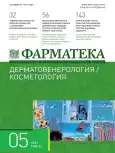Физиотерапевтический подход в лечении розацеа. Современные подходы терапии розацеа через призму патогенеза
- Авторы: Ханалиева И.А.1,2, Свечникова Е.В.2,3, Гладько В.В.2, Измайлова И.В.2
-
Учреждения:
- Первый Московский государственный медицинский университет имени И.М. Сеченова (Сеченовский Университет)
- Российский биотехнологический университет
- Поликлиника № 1 Управления делами Президента РФ
- Выпуск: Том 32, № 5 (2025)
- Страницы: 56-59
- Раздел: Клинический опыт
- URL: https://journal-vniispk.ru/2073-4034/article/view/316492
- DOI: https://doi.org/10.18565/pharmateca.2025.5.56-59
- ID: 316492
Цитировать
Аннотация
Розацеа представляет собой хроническое дерматологическое заболевание, характеризующееся рецидивирующими воспалительными реакциями и сосудистыми изменениями. Одним из перспективных направлений в лечении данного заболевания является световая терапия, в частности использование технологии IPL (интенсивного импульсного света). Данная методика демонстрирует высокие результаты в снижении выраженности сосудистых и воспалительных проявлений, а также характеризуется высоким профилем безопасности. Несмотря на доказанную клиническую эффективность применения IPL-терапии в лечении розацеа, вопросы оптимизации параметров процедуры по-прежнему остаются актуальными. В настоящей статье представлены современные данные об эффективности применении IPL-терапии для лечения розацеа, патогенез и основные параметры данной методики, а также представлен наш опыт использования передовых технологических решений в данной области.
Ключевые слова
Полный текст
Открыть статью на сайте журналаОб авторах
Исита Адылмажитовна Ханалиева
Первый Московский государственный медицинский университет имени И.М. Сеченова (Сеченовский Университет); Российский биотехнологический университет
Автор, ответственный за переписку.
Email: doctor.khanalieva@mail.ru
ORCID iD: 0000-0003-4426-1934
SPIN-код: 7131-3022
врач-дерматолог, косметолог, пластический хирург, врач УЗД; ассистент кафедры кожных и венерических болезней
Россия, Москва; МоскваЕлена Владимировна Свечникова
Российский биотехнологический университет; Поликлиника № 1 Управления делами Президента РФ
Email: doctor.khanalieva@mail.ru
ORCID iD: 0000-0002-5885-4872
д.м.н., профессор кафедры кожных и венерических болезней; зав. отделением дерматовенерологии и косметологии
Россия, Москва; МоскваВиктор Владимирович Гладько
Российский биотехнологический университет
Email: dr.gladko@mgupp.ru
ORCID iD: 0000-0003-3087-5038
д.м.н., профессор, зав. кафедрой кожных и венерических болезней с курсом косметологии МИНО
Россия, МоскваИрина Валентиновна Измайлова
Российский биотехнологический университет
Email: izmajjlovaiv@mgupp.ru
к.м.н., доцент кафедры кожных и венерических болезней с курсом косметологии МИНО
Россия, МоскваСписок литературы
- Geng R.S.Q., Bourkas A.N., Mufti A., Sibbald R.G. Rosacea: pathogenesis and therapeutic correlates. J Cutan Med Surg. 2024;28(2):178–189. https://dx.doi.org/10.1177/12034754241229365
- Hofmann M.A., Lehmann P. Physical modalities for the treatment of rosacea. J Dtsch Dermatol Ges. 2016;14 Suppl 6:38–43. https://dx.doi.org/10.1111/ddg.13144
- Babilas P., Schreml S., Szeimies R.M., Landthaler M. Intense pulsed light (IPL): a review. Lasers Surg Med. 2010;42(2):93–104. https://dx.doi.org/10.1002/lsm.20877
- Martignago C.C.S., Bonifacio M., Ascimann L.T., et al. Efficacy and safety of intense pulsed light in rosacea: a systematic review. Indian J Dermatol Venereol Leprol. 2024;90:599–605. https://dx.doi.org/10.25259/IJDVL_1029_2022
- Liu J., Liu J., Ren Y., Li B., Lu S. Comparative efficacy of intense pulsed light for different erythema associated with rosacea. J Cosmet Laser Ther. 2014;16:324–327. https://dx.doi.org/10.3109/14764172.2014.957218
- Luo Y., Luan X.L., Zhang J.H., et al. Improved telangiectasia and reduced recurrence rate of rosacea after treatment with 540 nm-wavelength intense pulsed light: a prospective randomized controlled trial with a 2-year follow-up. Exp Ther Med. 2020;19:3543–3550. https://dx.doi.org/10.3892/etm.2020.8617
- Dinsdale G., Murray A., Moore T., et al. A comparison of intense pulsed light and laser treatment of telangiectases in patients with systemic sclerosis: a within-subject randomized trial. Rheumatol (Oxford). 2014;53:1422–1430. https://dx.doi.org/10.1093/rheumatology/keu006
Дополнительные файлы
















